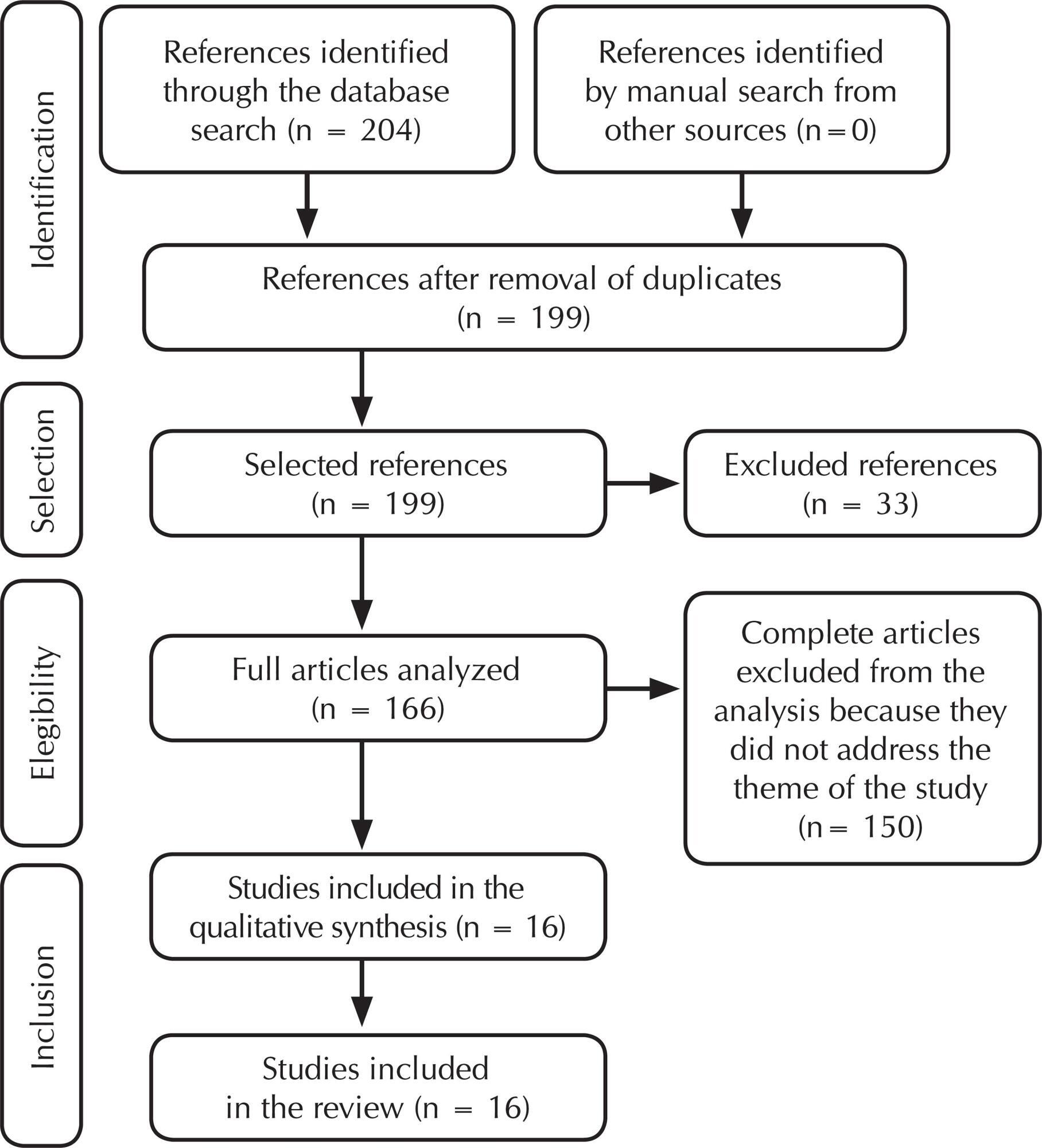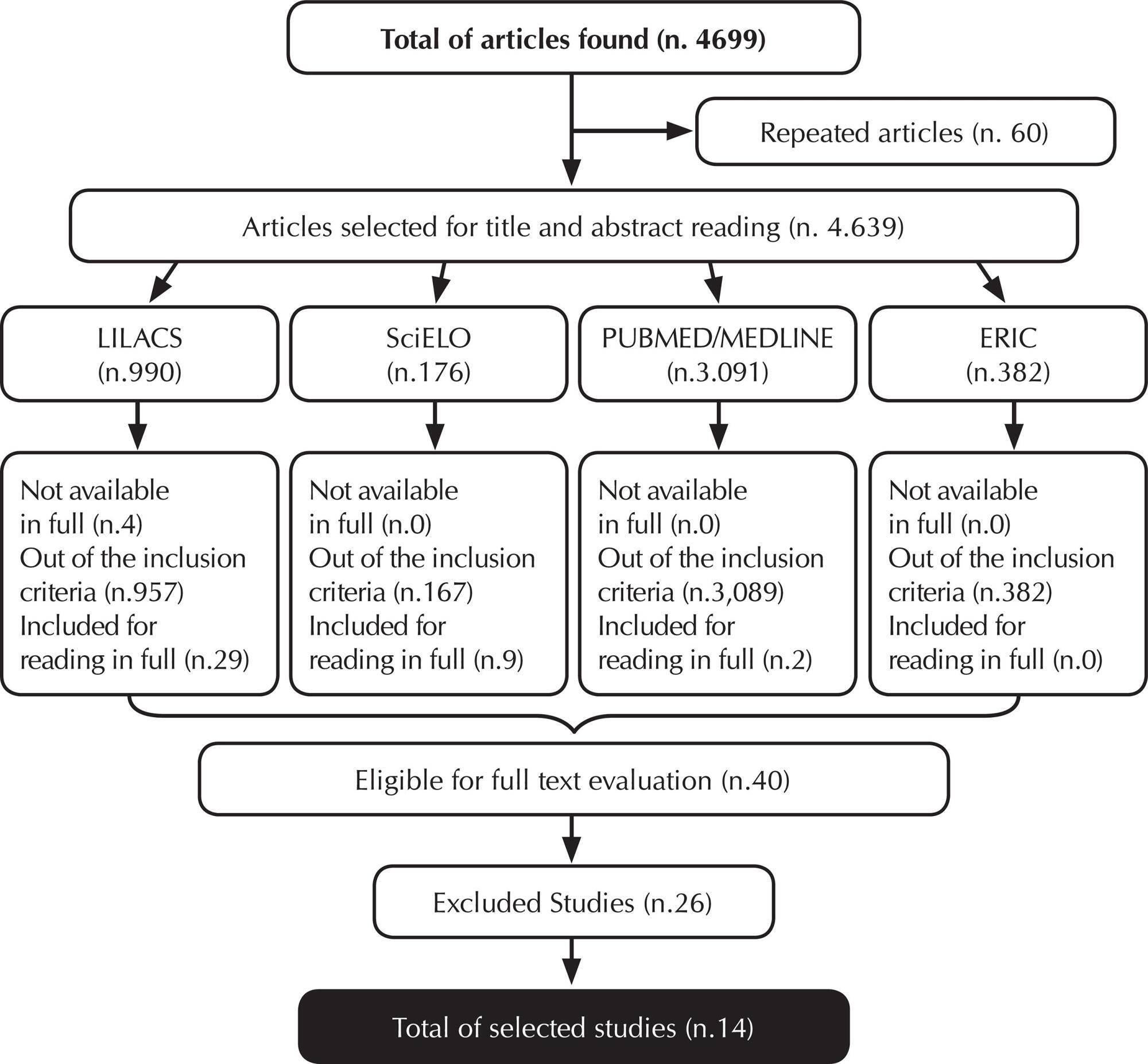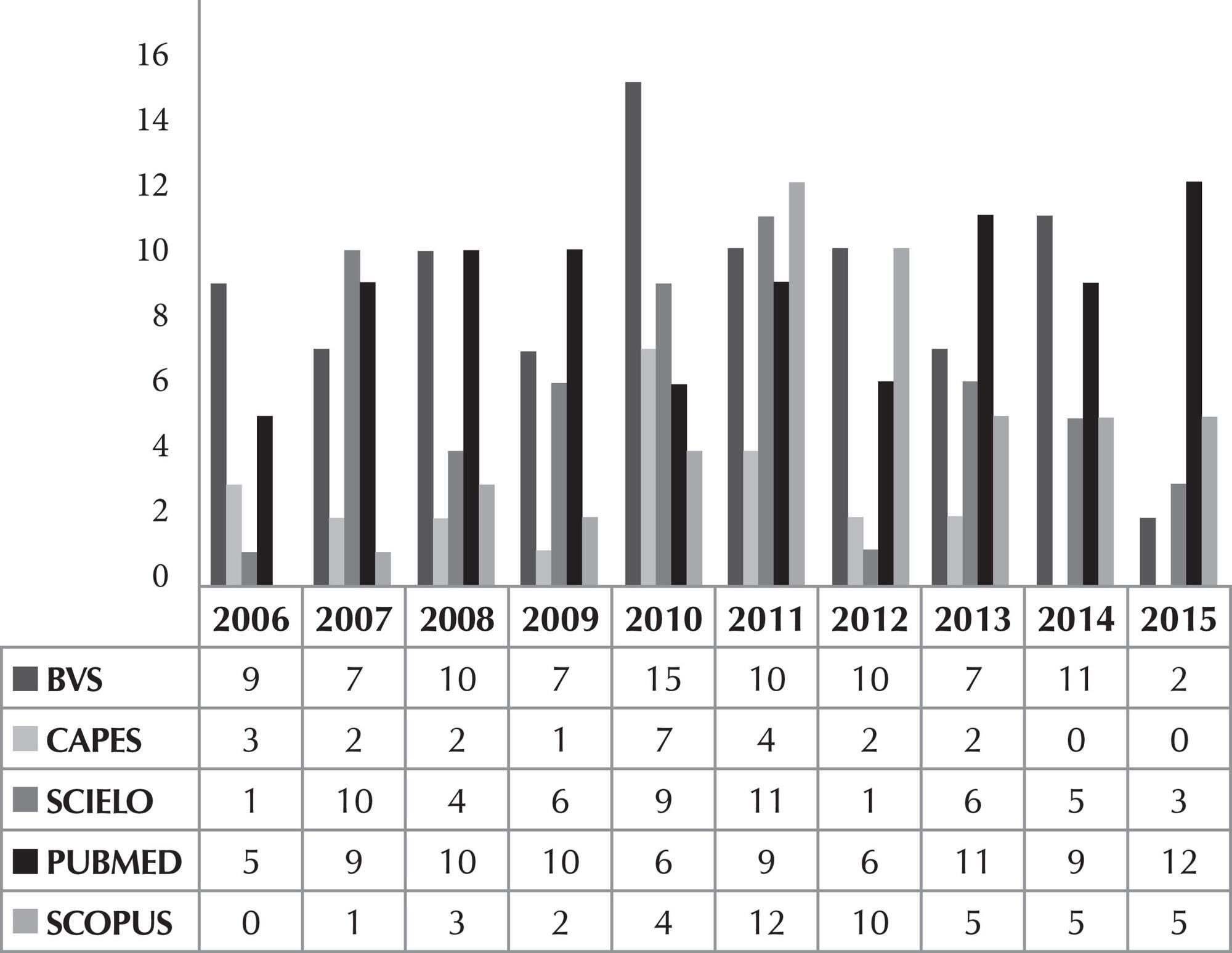-
EXPERIENCE REPORT01-01-2018
Death education: sensibility for caregiving
Revista Brasileira de Enfermagem. 2018;71:1779-1784
Abstract
EXPERIENCE REPORTDeath education: sensibility for caregiving
Revista Brasileira de Enfermagem. 2018;71:1779-1784
DOI 10.1590/0034-7167-2017-0018
Views0See moreABSTRACT
Objective:
to report the application of a participatory teaching-learning method on the themes death, dying, and associate care to highlight its applicability to the students.
Method:
report of application of participatory method in 22 students from the 6th period of the undergraduate program in Nursing and Obstetrics of a public university. The first stage focused on personal experiences of the students and the second on professional prospects. As resources for data collection we used music, drawing, drama, and photography.
Results:
after applying the method, the students assigned meanings to death and nursing care, reflected, criticized, and resignified experiences on the theme.
Conclusion:
the method was considered applicable and effective to achieve the objective, that is, it enables learners to act as protagonists of the teaching-learning process, building together a new perspective of end-of-life care.
-
EXPERIENCE REPORT01-01-2018
Community intervention in the Nursing education: experience report
Revista Brasileira de Enfermagem. 2018;71:1774-1778
Abstract
EXPERIENCE REPORTCommunity intervention in the Nursing education: experience report
Revista Brasileira de Enfermagem. 2018;71:1774-1778
DOI 10.1590/0034-7167-2017-0351
Views0See moreABSTRACT
Objective:
To report the implementation and results of community intervention projects used as a strategy for teaching and developing people and communities in the training of community health nursing specialists at the Centro de Formação de Saúde Multiperfil (Multi-profile Health Training Center), Angola.
Method:
Report of experience of the use of community intervention projects in nursing.
Results:
Community intervention projects have contributed to the learning of students and to the promotion of health, citizenship and the empowerment of individuals and communities. Its implementation is in the fourth year, and 16 projects have already been developed in 2 distinct neighborhoods, and this year the intervention will cover a third.
Conclusions:
Nursing teaching should adopt strategies that lead the student not only in the path of professional autonomy, but, above all, in the empowerment of people and communities. Community intervention is undoubtedly important in this area.
-
EXPERIENCE REPORT01-01-2018
The Pororoca effect on permanent education in health: about the interaction research-work
Revista Brasileira de Enfermagem. 2018;71:1768-1773
Abstract
EXPERIENCE REPORTThe Pororoca effect on permanent education in health: about the interaction research-work
Revista Brasileira de Enfermagem. 2018;71:1768-1773
DOI 10.1590/0034-7167-2017-0462
Views0See moreABSTRACT
Objective:
to build municipal responsibility with the permanent education in health policy from the interaction between research and innovation of work practices.
Method:
experience reports structured through dialogic meetings that allowed the participative diagnosis and strategic administration considering research in health education.
Results:
from the activities and interactions, we identified active forces in the reinvention of training for workers in the municipal network of health services, in which we found three streams: “inside and outside interactions”, “movement towards meetings” and “strategic collective arrangements”.
Final considerations:
through action research and a collaborative critique, collective movements were constructed, they showed ways to produce new directions in health education and allowed the strategic creation of the Núcleo de Educação Permanente as a responsibility of the municipal government, not depending on Federal policies.
-
REVIEW01-01-2018
Educational technologies and practices for prevention of vertical HIV transmission
Revista Brasileira de Enfermagem. 2018;71:1759-1767
Abstract
REVIEWEducational technologies and practices for prevention of vertical HIV transmission
Revista Brasileira de Enfermagem. 2018;71:1759-1767
DOI 10.1590/0034-7167-2016-0333
Views0See moreABSTRACT
Objective:
to assess available evidence on educational technologies and practices for prevention of vertical HIV transmission.
Method:
LILACS, PubMed, Scopus, BDENF, between April and May 2016, with the descriptors: “Vertical Transmission of Infectious Disease”, “HIV”, “Health Education” and “Technology”.
Results:
there are 16 articles published between 2000 and 2014, mostly Brazilian and African, Cross-sectional and with low level of evidence. The studies covered the use of hard technologies, through video, radio and telephone, and soft, emphasizing, in particular, counseling.
Conclusion:
the studies recognize the importance of educational activities as a tool for health promotion in the context of vertical HIV transmission, despite reporting the need for constant training of professionals and urgency in the renewal of educational concepts and practices. Therefore, it is recommended to expand and consolidate health counseling and emphasize the role of nurses as an important actor in this setting.

-
REVIEW01-01-2018
Liberating critical pedagogy of Paulo Freire in the scientific production of Nursing 1990-2017
Revista Brasileira de Enfermagem. 2018;71:1751-1758
Abstract
REVIEWLiberating critical pedagogy of Paulo Freire in the scientific production of Nursing 1990-2017
Revista Brasileira de Enfermagem. 2018;71:1751-1758
DOI 10.1590/0034-7167-2017-0699
Views0See moreABSTRACT
Objective:
To analyze the theoretical and methodological application of Paulo Freire’s critical pedagogy in the scientific production of nursing.
Method:
An integrative review was carried out with consultation of the databases: LILACS, BDENF, MEDLINE, PUDMED and CINHAL. We included studies in the Spanish, English and Portuguese languages, published from 1990 to 2017.
Results:
A total of 38 articles were analyzed, of which the main concepts adopted were: dialogue/dialogicity, awareness/critical awareness and questioning. Regarding the application of the method, it was noticed the predominance of the adoption of elements such as culture circles, thematic phase and horizontality relation of the nurse with the individuals involved.
Conclusion:
Nursing has partially appropriated the Freire’s referential. However, it reveals the intentionality of a transformative practice that requires deepening for the implementation of the method in its full.

-
REVIEW01-01-2018
Supervised internship in undergraduate education in nursing: integrative review
Revista Brasileira de Enfermagem. 2018;71:1740-1750
Abstract
REVIEWSupervised internship in undergraduate education in nursing: integrative review
Revista Brasileira de Enfermagem. 2018;71:1740-1750
DOI 10.1590/0034-7167-2017-0340
Views0See moreABSTRACT
Objective:
to analyze the evidence available in the literature on the contributions of the Supervised Internship in nursing training in Brazil and the teaching-learning methods employed.
Method:
integrative review of the literature, with search of articles published between 2002 and 2016, in PubMed, LILACS, SciELO and Eric databases.
Results:
Of the 4,699 articles consulted, 14 met the inclusion criteria. The analysis of these studies revealed three thematic categories: the understanding about the role of Supervised Internship; the teaching-learning processes employed; and their contributions to the training of nurses.
Final considerations:
this is a fundamental element in the academic training, since, depending on the didactic-pedagogical organization, it makes possible the (re) signification of the acquired knowledge throughout the course and realizes the professional competences. The teaching-learning methods are structured by the critical pedagogy, being the active methodologies the main choices of the authors.

-
REVIEW01-01-2018
Nursing higher education in MERCOSUR: a bibliometric study
Revista Brasileira de Enfermagem. 2018;71:1732-1739
Abstract
REVIEWNursing higher education in MERCOSUR: a bibliometric study
Revista Brasileira de Enfermagem. 2018;71:1732-1739
DOI 10.1590/0034-7167-2017-0405
Views0See moreABSTRACT
Objective:
to identify productions that approach nursing high education in member states of MERCOSUR.
Method:
bibliometric study with quantitative approach carried out in search mechanisms, such as BVS, Capes, SciELO, Scopus and PubMed, between 2006 and 2015. It was found 301 articles about nursing education in MERCOSUR.
Results:
point to concern for the nurse’s education for public health policies, for teacher’s education and the teaching-learning process. However, publications regarding technologies associated with distance education on health field are low.
Conclusion:
this study contributes with discussion in nursing education field when points to the themes regarding the production about nurses’ education in MERCOSUR, specially, the range of targets set up in the Educational MERCOSUR agreement.

-
REVIEW01-01-2018
Educational technologies for health education on stroke: an integrative review
Revista Brasileira de Enfermagem. 2018;71:1724-1731
Abstract
REVIEWEducational technologies for health education on stroke: an integrative review
Revista Brasileira de Enfermagem. 2018;71:1724-1731
DOI 10.1590/0034-7167-2017-0041
Views0See moreABSTRACT
Objective:
to identify in the scientific literature the educational technologies used in the health education process related to stroke.
Method:
integrative review, whose eligibility criteria of the articles were: match the keywords “health education” and “stroke”; be a research paper; be in Portuguese, English and Spanish; be available electronically in the databases LILACS, PubMed/Medline, Scopus and CINAHL; year of publication between 2000 and 2016.
Results:
24 publications were found. The analysis was carried out by means of analytical and interpretive readings. There were many educational technologies used in the health education process for stroke.
Final considerations:
the printed material for general public stood out, aiming to the recognition of alert signs of the disease and the emergency decision-making before suspicious cases of the disease.
-
EXPERIENCE REPORT10-26-2020
Brazilian Nursing Process Research Network contributions for assistance in the COVID-19 pandemic
Revista Brasileira de Enfermagem. 2020;73:e20200798
Abstract
EXPERIENCE REPORTBrazilian Nursing Process Research Network contributions for assistance in the COVID-19 pandemic
Revista Brasileira de Enfermagem. 2020;73:e20200798
DOI 10.1590/0034-7167-2020-0798
Views0See moreABSTRACT
Objective:
to describe the theoretical construction process of nursing process support documents in COVID-19 care scenarios.
Methods:
an experience report of the joint activity of the Brazilian Nursing Process Research Network (Rede de Pesquisa em Processo de Enfermagem) composed of Higher Education and Health Institution researchers in Brazil.
Results:
five instruments were organized collectively, involving the elements of nursing practice (nursing diagnoses, outcomes and interventions) in assistance for community; for patients (with suspected or mild, moderate, and critical COVID-19 and residents in Nursing Homes); for nursing workers’ health support, also subsidizing registration and documentation during the COVID-19 pandemic.
Final considerations:
valuing the phenomena manifested by families/communities, patients and health professionals is essential for early detection, intervention, and prevention of diseases.
-
11-13-2020
Fear of childbirth in time of the new coronavirus pandemic
Revista Brasileira de Enfermagem. 2020;73:e20200551
Abstract
Fear of childbirth in time of the new coronavirus pandemic
Revista Brasileira de Enfermagem. 2020;73:e20200551
DOI 10.1590/0034-7167-2020-0551
Views0See moreABSTRACT
Objective:
Reflect on how the new coronavirus pandemic triggered or accentuated the fear of childbirth in pregnant women and affected childbirth care practices.
Methods:
Reflective analysis of women’s pregnancy and childbirth experiences during the current pandemic, supported by the latest scientific evidence and recommendations on the topic.
Results:
Pregnancy and childbirth are life-changing events for women, but during the new coronavirus pandemic, fear and uncertainty have taken on an unprecedented dimension in the negative way that many pregnant women have anticipated and experienced childbirth.
Final considerations:
The current period has accentuated a chronic problem: a paternalistic system of health institutions in the approach to childbirth, dense with additional levels of fear in pregnant women. In this context, addressing the fear of childbirth means not giving up the promotion of safe and positive birth experiences for women.

-
09-16-2019
Socioeconomic factors related to leprosy: an integrative literature review
Revista Brasileira de Enfermagem. 2019;72(5):1405-1415
Abstract
Socioeconomic factors related to leprosy: an integrative literature review
Revista Brasileira de Enfermagem. 2019;72(5):1405-1415
DOI 10.1590/0034-7167-2017-0651
Views0See moreABSTRACT
Objective:
To investigate in the literature the relation of socioeconomic factors in the incidence of the disease and other outcomes related to leprosy.
Method:
Integrative review conducted in Lilacs, Medline, Scopus databases and SciELO online library with studies from 2000 to 2016.
Results:
32 studies were included. Only studies that analyzed statistical associations of socioeconomic factors and outcomes related to leprosy were selected.
Conclusion:
Leprosy is greatly affected by the social context in which the patient is inserted, the chances of exposure to illness are the result of a set of not only individual aspects, but also of contexts or collective conditions. It is imperative for Nursing, as an essential part of the multiprofessional team entrusted with the care and surveillance of the disease, to recognize these factors to predict unfavorable outcomes and to develop new practices capable of reducing inequities.

-
ORIGINAL ARTICLE06-27-2019
Literacy in health and self-care in people with type 2 diabetes mellitus
Revista Brasileira de Enfermagem. 2019;72(3):700-706
Abstract
ORIGINAL ARTICLELiteracy in health and self-care in people with type 2 diabetes mellitus
Revista Brasileira de Enfermagem. 2019;72(3):700-706
DOI 10.1590/0034-7167-2018-0291
Views0See moreABSTRACT
Objective:
To evaluate the effect of educational intervention in the adherence to self-care activities and functional health literacy and numeracy in people with type 2 diabetes mellitus.
Methods:
This was a quasi-experimental study conducted in two units of the Brazilian Family Health Strategy, involving people with diabetes. Educational interventions occurred in three meetings, weekly, lasting 60 minutes on average. Data were collected using the Questionário de Autocuidado com o Diabetes, before and after the interventions.
Results:
55 people participated in the study. After the interventions, the greatest difference for a better adherence to self-care was the item “inspecting the inside of the shoes before putting them on”, with 3.29 days in the week delta at analytical level. The worst was “taking insulin shots as recommended”, with 0.00 days a week delta at basic level.
Conclusion:
Educational interventions had a positive effect on adherence to self-care and functional literacy in health.
-
REVIEW04-22-2020
Polycyclic aromatic hydrocarbons and development of respiratory and cardiovascular diseases in workers
Revista Brasileira de Enfermagem. 2020;73(3):e20180965
Abstract
REVIEWPolycyclic aromatic hydrocarbons and development of respiratory and cardiovascular diseases in workers
Revista Brasileira de Enfermagem. 2020;73(3):e20180965
DOI 10.1590/0034-7167-2018-0965
Views0See moreABSTRACT
Objectives:
to identify the scientific evidence on the development of cardiovascular and respiratory diseases due to workplace contamination by polycyclic aromatic hydrocarbons.
Methods:
integrative literature review. The search for primary articles was held in October 2017 in the Medical Literature Analysis and Retrieval System Online (through Pubmed), Web of Science and Latin American and Caribbean Literature in Health Sciences (LILACS).
Results:
the 16 studies analyzed showed that exposure to polycyclic aromatic hydrocarbons was associated with cardiovascular diseases, such as increased blood pressure, heart rate variation, and ischemic heart disease; and respiratory disorders, such as decreased lung function, chronic obstructive pulmonary disease, asthma, wheeze, coughing, pulmonary wheezing, chest tightness, effort dyspnea, and sore throat.
Conclusions:
polycyclic aromatic hydrocarbons cause deleterious effects on the cardiovascular and respiratory systems through mutations and cellular inflammation, being a risk to exposed individuals.

-
ORIGINAL ARTICLE02-17-2020
Occupational stress in nursing professionals of a university hospital
Revista Brasileira de Enfermagem. 2020;73(2):e20180997
Abstract
ORIGINAL ARTICLEOccupational stress in nursing professionals of a university hospital
Revista Brasileira de Enfermagem. 2020;73(2):e20180997
DOI 10.1590/0034-7167-2018-0997
Views0See moreABSTRACT
Objectives:
To identify the presence of occupational stress in nursing professionals of a university hospital in the inlands of the state of Minas Gerais and examine influence of sociodemographic and occupational characteristics in this disease.
Methods:
Cross-sectional, exploratory and quantitative study with 124 professional nurses from a university hospital in the inlands of the state of Minas Gerais. The adapted and validated Portuguese version of the Job Stress Scale (JSS) was used for the performance of the study.
Results:
Most professionals were women (87.9%) with a mean age of 40.2 years, 80.6% were nursing technicians and 71.8% of the sample had some degree of exposure to occupational stress.
Conclusions:
The occupational stress index was higher than that observed in previous studies. Data obtained in the study point to the need to implement institutional measures for the prevention of occupational stress, especially by strengthening social support at work.
-
ORIGINAL ARTICLE07-08-2020
Development and validation a nursing care protocol with educational interventions for family caregivers of elderly people after stroke
Revista Brasileira de Enfermagem. 2020;73:e20180894
Abstract
ORIGINAL ARTICLEDevelopment and validation a nursing care protocol with educational interventions for family caregivers of elderly people after stroke
Revista Brasileira de Enfermagem. 2020;73:e20180894
DOI 10.1590/0034-7167-2018-0894
Views0See moreABSTRACT
Objective:
development and validation the content of a nursing care protocol with educational interventions for family caregivers of elderly people after stroke.
Methods:
a methodological study conducted in three stages: (1) protocol development through literature review; (2) pretest with multidisciplinary team, analyzed with literature articulation; (3) protocol validation by the Delphi Technique.
Results:
the protocol was structured in the following areas: Disease Guidelines; Emotional Support; Using the Health Care Network; Diet; Airways; Medications; Hygiene; Skin Care; Disposal; Dressing/Undressing; Positioning and Transfer; Fall Prevention. In the pretest, eight experts assessed protocol clarity and content. In validation, there were two rounds by the Delphi Technique. The validated protocol consisted of 12 domains, containing 42 items and 240 care guidelines.
Conclusion:
the protocol qualifies the transition of care after hospital discharge assisting nurses in home care practice.

-
ORIGINAL ARTICLE03-07-2022
Is social isolation during the COVID-19 pandemic a risk factor for depression?
Revista Brasileira de Enfermagem. 2022;75:e20210594
Abstract
ORIGINAL ARTICLEIs social isolation during the COVID-19 pandemic a risk factor for depression?
Revista Brasileira de Enfermagem. 2022;75:e20210594
DOI 10.1590/0034-7167-2021-0594
Views0See moreABSTRACT
Objective:
To assess factors associated with depression among higher education students and professionals during the peak of the COVID-19 pandemic.
Method:
quantitative study with a cross-sectional design. 550 students and professionals participated. The data were collected by means of a digital questionnaire that included Patient Health Questionnaire-9 to assess depressive symptoms.
Results:
The factors related to depression and social isolation outcomes were significantly associated with the female gender (n= 149; 37,8%; Odds Ratio OR=2,0), white (n=127; 37,2%; OR=1,60), young people (n=130; 39,4%; OR=2,0), without religion (n=70; 40,2%; OR=1,64), with financial problems (n=80; 53,0%; OR=2,40) and family problems (n=98; 47,3%; OR=1,77); who suffered violence during the quarantine (n=28; 58,3%; OR=2,33), increased the use of illicit drugs (n=16; 59,3%; OR=2,69), used sedatives without a medical prescription (n=75; 54,0%; OR=2,94), lived in conflicting relationships (n=33; 54,1%;OR=2,14), lost their job during the pandemic (n=32; 59,3%; OR=1,99) and presented symptoms of anxiety related to COVID-19 (n=155; 45,2%; OR=3,91).
Conclusion:
there is a meaningful relationship between vulnerability and adopting risk behaviors during the pandemic-imposed social isolation with depressive symptoms. We suggest that health professionals be attentive to the need to adjust their psychosocial interventions when promoting strategies when promoting strategies to mitigate the effects and risks to mental health.
Search
Search in:
Nuvem de Tags
Adolescente (85) Atenção Primária à Saúde (239) COVID-19 (91) Criança (91) Cuidados de Enfermagem (269) Educação em Enfermagem (151) Educação em Saúde (139) Enfermagem (930) Enfermagem Pediátrica (86) Estudantes de Enfermagem (77) Estudos de Validação (131) Família (87) Idoso (208) Promoção da Saúde (99) Qualidade de Vida (104) Saúde do Trabalhador (86) Saúde Mental (145) Saúde Pública (82) Segurança do Paciente (150) Tecnologia Educacional (100)



